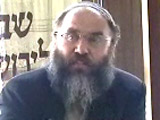Beit Midrash
- Torah Portion and Tanach
- Vayikra
- Vayikra
- Sections
- Chemdat Yamim
- Parashat Hashavua
Almost the entire Sefer Vayikra and, especially, this first parasha deals with the service of the kohanim in the Mishkan and beyond it. These activities belong to the mitzvot between man and Hashem. These p’sukim, in contrast, deal with matters between man and his fellow man, and the Torah still calls it a ma’al baHashem. In addition, how does a human being carry out a ma’al of Hashem? We will suggest an explanation based on the simple reading.
The simple answer is that one "misappropriates" from Hashem by taking or withholding that which belongs to another person, as the pasuk continues to bring examples. One way is by watching an object or money and denying it in order to keep it, or take money that you were supposed to have been investing for someone else and pocketing it instead. Of course, there is simple theft. And finally, there is the severe sin of withholding pay (or benefits) from a worker. The conclusion of this is that this type of monetary impropriety against an individual is also a direct affront against Hashem.
We will now present another explanation, this one more homiletic of nature. A physical person has a spirit (nefesh), like other members of the animal kingdom. What makes him different is his neshama (soul), which is a divine element. Man receives his neshama as a pikadon (for safekeeping), and when his life is over (hopefully at 120), he returns it. He must be very careful how he guards it, especially since he is borrowing it, a status that obligates a normal watchman of that type to be liable to pay for it even if it is lost or destroyed due to extenuating circumstances. If he uses the "object" normally and, as a result, something happens to it, he is exempt, but if he uses it in a nonstandard way then he is obligated. So the affront to Hashem is if he uses his soul in a manner that is different from that for which his Maker earmarked it, for example by taking advantage of the monetary rights of his fellow human being. Then, even if his observance in matters between man and Hashem was good, he is still in a difficult position in relation to the owner of the soul.
The Coronavirus has been damaging humanity as a whole, but of course we feel close to home how strongly it has affected the Jewish people worldwide, including as we are preparing for Pesach. This causes us to do soul searching. We may have to be separated for a time from very close relatives, as we have on and off for a year. We have the opportunity to "look for chametz in holes and cracks," i.e., within our souls, in the deepest and often highest places of our soul. We need to escape thinking too much about the welfare of our personal ego, which can be compared to the leavening agents that cause things to puff up. When one sees himself as in the center, then he can try to take things for himself, as the pasuk we started with describes. We need to find the afiku man, representing taking out the manna, which came in the desert instead of the unleavened matzot. Then we can sing of the redemption of our souls.
In Egypt, we put the blood on the doorposts to avoid the plague (Shemot 12:13). Let us unite and put the needs of the community before the needs of the individual, and hopefully we will also be spared of the plague as well.

Return in Order to Return
Parashat Vayikra
Rabbi Yossef Carmel | 3 Nisan 5766

Why Couldn't Moshe Enter the Mishkan??
Rabbi Re'em Hacohen | Adar II 9 5782

The Leader Sinned
Rabbi Yossef Carmel | Adar II 5 5782





















